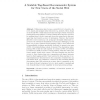Free Online Productivity Tools
i2Speak
i2Symbol
i2OCR
iTex2Img
iWeb2Print
iWeb2Shot
i2Type
iPdf2Split
iPdf2Merge
i2Bopomofo
i2Arabic
i2Style
i2Image
i2PDF
iLatex2Rtf
Sci2ools
200
click to vote
DEXA
2011
Springer
2011
Springer
A Scalable Tag-Based Recommender System for New Users of the Social Web
Abstract. Folksonomies have become a powerful tool to describe, discover, search, and navigate online resources (e.g., pictures, videos, blogs) on the Social Web. Unlike taxonomies and ontologies, which overimpose a hierarchical categorisation of content, folksonomies empower end users, by enabling them to freely create and choose the categories (in this case, tags) that best describe a piece of information. However, the freedom afforded to users comes at a cost: as tags are informally defined and ungoverned, the retrieval of information becomes more challenging. In this paper, we propose Clustered Social Ranking (CSR), a novel search and recommendation technique specifically developed to support new users of Web 2.0 websites finding content of interest. The observation underpinning CSR is that the vast majority of content on Web 2.0 websites is created by a small proportion of users (leaders), while the others (followers) mainly browse such content. CSR first identifies who the ...
Art Techniques | Database | DEXA 2011 | Ording | Social Web |
Related Content
| Added | 18 Dec 2011 |
| Updated | 18 Dec 2011 |
| Type | Journal |
| Year | 2011 |
| Where | DEXA |
| Authors | Valentina Zanardi, Licia Capra |
Comments (0)

